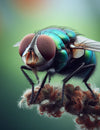
Pesticides play a very important role in agriculture and human health as well. Pesticides are needed to grow the food healthier and terminate the pests. But is it happening? What we sow we eat, but it will be affected by pesticides.
We generally use a pesticide that includes harsh chemicals, they will defiantly give fast or instant results. But these pesticides add toxicity to the food. The toxicity of pesticides is generally defined by five levels (Ia, Ib, II, III, and U).
Ia is considered as highly hazardous, while u is considered lowest at toxicity level.
To save ourselves from them we need to switch to organic pesticide use. They might have been comparatively slower at results. But has better results and is safer to use. You must have heard IPM (Integrated Pest Management).
IPM is an effective, safer, and environmentally sensitive approach to treating pests. It uses ways that don’t add toxicity to crops but solve the pests’ problem as well. Organic pesticides are also used in this standard of pest management.
What is a natural and organic insecticide?
Natural insecticides are compounds that are made by combining minerals, biological material, plant-based chemicals, and products like pyrethrum, neem, spinosad, garlic, rotenone, essential oil, and many more.
Some plants, animals, and manure work as a natural insecticide.
As natural insecticide organic insecticide are also is popular when it comes to IPM (Integrated Pest Management). Organic insecticides are more like repellent than insecticides. It is an insecticide that only uses organic elements to treat bugs and pests.
One of the examples of organic insecticide is “garlic”. Garlic has extraordinary results to treat bugs like chiggers and borers and other pests harmful to fruit trees.
Both natural and organic insecticides tend to repel or treat harmful pests or bugs and not beneficial ones.
Botanical insecticide or plant insecticide
Many plants and minerals have the quality of insecticide that is harmful to pests. These kinds of pesticides (insect toxins) are directly achieved from plants or minerals. Botanical insecticides are also known as a natural insecticides.
Pyrethrins
This is one of the toxic and mostly used natural insecticides that is achieved from plants. It is derived from the plant pyrethrum daisy. This pesticide is not quite effective for pests that live deep inside the plants.

Pyrethrin is mildly toxic to pets, people, and wildlife, so use it cautiously while using after reading the instruction label carefully.
There are also some other bio-pesticides like pyrethrin such as rotenone, sabadilla, and nicotine extract. These are considered more toxic than pyrethrin, in some cases, they are more toxic than synthetic pesticides.
Neem Oil
Neem oil is a poisonous extract of the neem tree that can be widely available in garden centers. Neem oil is also known as an all-purpose insecticide. Neem oil terminates the grubs and nematodes beneath the soil, cabbage worms, and squash bugs.
Neem oil needs to be sprayed repeatedly for better effectiveness. It doesn’t kill beneficial insects. Neem oil also has a great advantage that pests don’t develop resistance against it.



